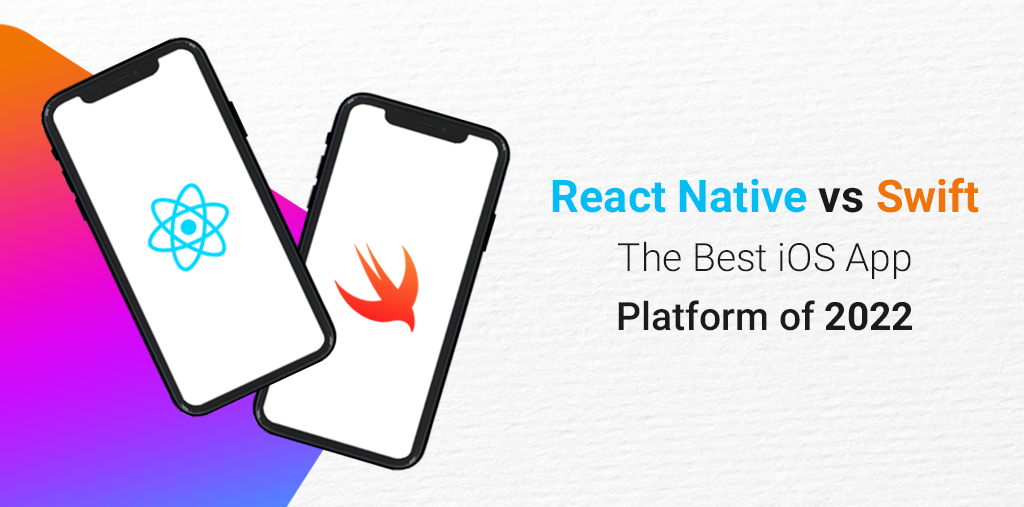Do you intend to create a native iOS or cross-platform application for your company? Are you debating whether to use Swift or React Native to offer your project a distinct look and feel?
It is no surprise that businesses choose to build iOS applications first because monetization is one of the most important aims of any app development. When computer professionals discuss iOS app development, they frequently reference Swift, a programming language that allows the production of native iOS applications. However, React Native is mentioned since it is a well-known JavaScript framework for developing platform-independent mobile apps.
In this post, we’ll look at Swift and React Native for iOS development, as well as explore them and their use cases. Finally, a full comparison of both platforms will help you choose the best one for your iOS app development needs.
React Native – A brief introduction
The React Native framework is a free and open-source JavaScript framework that lets you develop apps for iOS, Android, and the web. It brings all of its brilliance to mobile app development as a React-based framework.
Facebook created the React Native framework. React Native uses native-OS views to build the app’s user interface in JavaScript. If more complex functionality is necessary, Swift and Objective-C for iOS and Java and Kotlin for Android can be employed. Native apps use a distinct set of languages, tools, and frameworks dependent on the platform for which they are designed. Because code can be transferred between platforms, React Native makes mobile application development easier and less expensive for the react native development company.
React Native – Use Cases
- Quick prototype apps
- Applications with simplified user interfaces and near-native UX utilizing FlexBox
- Reusable components in mobile apps
- Cross-platform apps that provide a native-like experience
- Apps that can use synchronous APIs
Swift – A Brief Introduction
Swift is an open-source, multi-paradigm programming language for iPadOS, macOS, tvOS, watchOS, and iOS development. Apple established it in 2014 to provide developers with a strong language for developing iOS apps. It is a programming language that is interactive, safe, and succinct. It is designed to be a substitute for C-based programming languages. Swift is continually changing, and the Swift community is expanding. Swift source code is available on GitHub, making it accessible to anybody.
It provides an exceptional user experience and unrivaled app performance, which has contributed to its incredible popularity. Several well-known technological companies, including LinkedIn, Slack, Firefox, WordPress, and Lyft, employ Swift for iOS mobile app development.
Swift – Use Cases
- iOS Native Applications
- Business apps must meet stringent security standards.
- Server applications with high performance
- User interfaces that are smart and complicated.
- High memory management requirements for resource-intensive applications
- An application that can run on a variety of platforms.
Swift vs React Native – Neck-to-Neck comparison
In this section, we will offer you a comprehensive comparison of both Swift and React Native based on various vital parameters.
-
Stability
React Native allows developers to create a visually appealing native-like user experience, but it lacks Swift’s performance and reliability. Swift, on the other hand, allows you to quickly harness the capabilities of mobile devices and local languages to create a feature-rich and reliable application.
Judgment: Swift wins
-
Performance
Swift has an advantage here because of its native development strategy, which routinely outperforms cross-platform development. Swift is much ahead of the competition, especially when it comes to dynamic and graphic effects-heavy apps.
Judgment: Swift wins
-
Talent Pool
Although comparing these is difficult because React Native is a framework and Swift is a language, one may conclude that React Native has a significantly larger community.
Swift, on the other hand, has recently garnered enormous fame as a result of the unparalleled success of iPhones, but it still lacks an adequate talent pool.
Judgment: React Native wins
-
Speed of Coding
Swift is without a doubt your best choice if you are only designing iOS applications. The pace at which your code is determined by your objectives. Swift is the programming language to use if you are just creating apps for iOS. However, if you want to launch your solution on both iOS and Android, React Native will provide you with faster results.
Judgment: React Native wins
-
CI/CD support
Party solutions are required if you wish to automate your integration and delivery. Fastlane, Bitrise, CircleCI, and NeverCode may be used to build your delivery pipeline.
Swift, on the other hand, allows you to construct a CI/CD pipeline using tools like Bitrise, Buddybuild, TravisCI, and CircleCI. Swift outperforms React in this category.
Judgment: Swift wins
-
Security
You are more vulnerable to security attacks while using React Native. Because AsyncStorage runs globally and is unencrypted, you must construct an abstraction on top of it to store the app and user data. To safeguard their data in React Native applications, react native development services providers and app owners must use third-party technologies.
Swift, on the other hand, guarantees improved encryption and security configuration to offer a greater level of security for the app and user data.
Judgment: Swift wins
-
Third-party libraries and APIs
React Native has widespread community support, which is shown in the availability of a plethora of third-party libraries and APIs for developers.
They may use these frameworks and APIs to add new features to their apps while increasing connectivity with native components.
Swift, on the other hand, provides a plethora of APIs and iOS open-source libraries. It also allows for seamless third-party administration and maintenance, although it will take time to catch up to React Native.
Judgment: React Native
-
User Interface
React Native makes use of native components and APIs to develop native-like apps that look and feel very similar to native. Swift was designed specifically for native iOS programming, ensuring high-quality UI components for iOS devices.
Judgment: Swift wins.
-
Learning curve
React Native is a framework that supports JavaScript, the most commonly used programming language. As previously said, 68% of developers use JS to code, which indicates that these developers may simply adapt React Native to their job. Swift, on the other hand, is rather simple to learn, although there is still a learning curve.
Judgment: React Native wins
Conclusion
So, we’ve supplied you with a detailed comparison of Swift vs React Native, including all of the important points.
However, the decision between React Native and Swift is influenced by a variety of criteria, such as the type of application, project duration, money, and even personal preference.
If you are a startup looking to get more users and grow quickly, React Native is for you. Swift is a good choice if you want to keep upgrading the UI/UX and manage memory footprints properly. You cannot design a successful mobile application without a team of experienced mobile app developers, regardless of the framework, tool, or programming language you choose.


























